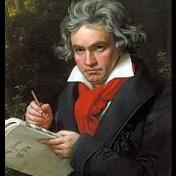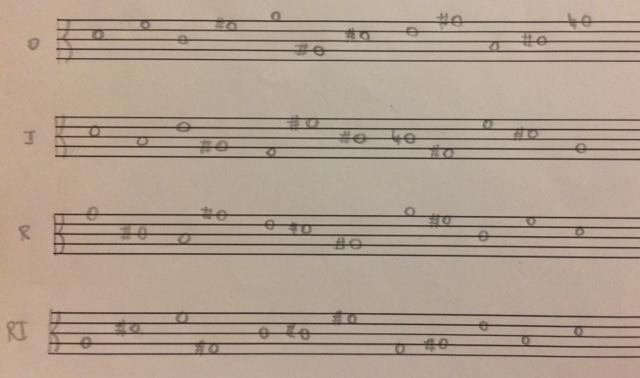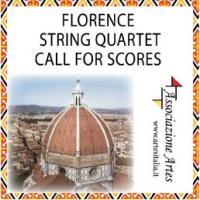Search the Community
Showing results for tags 'string quartet'.
-
Hi 🙂 I present you here my new short piece for string quartet. It's called "L'été", which means "Summer" in French 🙂 Have a nice day 🙂
-
Hey gang, I posted this piece earlier when I was in the middle of writing it. Here is the finished product. This is the piece I composed over the spring semester during my first semester of composition lessons at the university I am attending. Please enjoy and let me know what you think! (P.S. Evidently when you use Petrucci font in Finale, the tremolo stops working, so that's why it appears in the score, but is not in the MP3 [do the midi problems ever end...?])
- 1 reply
-
- string quartet
- strings
-
(and 7 more)
Tagged with:
-
Hello Everyone, This is a recent experimental showing my exploration in various styles. There are 3 movements: I. Allegro Moderato [5' 20"] II. Adagio [6' 48"] III. Vivace [4' 02"] The first movement adopts the 12-tone system (The tone series is shown in the score in a table). The second movement explores the use of polytonality. Hope you enjoy the music and I appreciate your comments:) Best, HoYin
- 2 replies
-
- polytonal
- string quartet
-
(and 1 more)
Tagged with:
-
So, I just got this idea yesterday of orchestrating Eine Kleine Nachtmusik. Should be easier to do than the Pathetique Sonata orchestration I did before. Since it is Mozart that I am orchestrating, I'm staying conservative with my instrumentation. Here is the instrumentation I plan on using for my orchestration: 2 flutes 2 oboes 2 clarinets 2 bassoons 3 horns 2 trumpets tympani 1st violins 2nd violins violas cellos double basses The reason I haven't put in numbers for the string instruments is because most likely, the orchestra will decide on their own what the best strings:other players ratio is or will know it from playing Mozart symphonies hundreds of times. Either way, it isn't like I know the strings:other players ratio for a classical period orchestra(which is what I'm aiming for with my instrumentation if you can't already tell), so I would have no clue on the ideal numbers for the string instruments. There are some spots where I see Mozart writes a phrase and then he repeats the phrase. These would be prime times to bring in more players or have some players take a rest(really depends on the dynamics of the initial phrase and the repeated phrase). And there are some extended creschendo passages as well. Those would be places where I increase the sound density. Extended diminuendo passages, I would do the exact opposite for. I would decrease the sound density. But do you have any suggestions on how to go from string quartet to orchestra? And in particular, what should I do about the triple stops that start the piece? I have been told that double stops, while they sound great in a solo, or even a quartet, when you get to the size of an orchestra, it becomes clunky in sound. The double stops I can simply either have more than 1 instrument group play it or make 1 staff divisi. But I have no idea what to do about the triple stops. If double stops sound clunky in an orchestra, then triple stops will sound even more clunky in an orchestra, so I obviously can't just leave them as triple stops. But what should I do about those triple stops? Here is a PDF of the entire piece as originally written:
-
These are my "Two Sententiae for String Quartet Op. 321". Here is the link of my previous set of sententiae for string quartet, again a set of two sententiae: https://www.youngcomposers.com/t36832/two-sententiae-for-string-quartet-op-311/ In the line of reposting some of my older pieces, I had also posted another set of sententiae for string quartet. Here's the link for that: https://www.youngcomposers.com/t36851/three-sententiae-for-string-quartet-op-139-old-deleted-piece-2181/
-
- sententia
- sententiae
-
(and 1 more)
Tagged with:
-
Hello everyone. It's my first post here in youngcomposers forum. So, I decided to start composing! My goal now is to compose a short piece every week, with some kind of limitations, to keep my work organized, more interesting and asking some research. To get started my limitation now was simple - write melody first and then harmonize it. So it's my first tune for 'one tune in a week' challenge, and my first composition for strings! Sounds a little silly, but I had some fun while composing this, and that I think is very important! Critiques and feedback are more than welcome! 🙂
-
This is the first string quartet I've ever written. I generally don't enjoy string-only ensembles, maybe because I didn't really grow up around strings at all. So writing this piece was really like pulling teeth a bit. I only really started to be okay with this piece when I was about three quarters of the way through and I finally got kind of a sense of the overall structure - before that I was floundering and feeling lost the whole time. This piece was written for a collaboration with the University of Stirling Art Gallery, which is running a Refugee Week in June with artwork and the like about refugees and their stories. I couldn't think what to do, but eventually decided to take an old Latvian folksong ('Jūrā gāju naudu sēti') and see how I could transform it, since two of my grandparents were refugees from Latvia. This is also something I've never tried before - taking someone else's musical material and working with it.
-
In Nomine audio mp3.mp3In Nomine score.pdf This was a piece written for a university composition and I chose to base it on the English 16th century genre 'In Nomine', based on the 'Gloria Tibi Trinitas' plainchant. The first half is an English renaissance pastiche (with the chant melody in the viola throughout) and the second half is serial (see tone rows above). The cadence at the end of the first half is used as a rhetorical device to further emphasis the juxtaposition of the two styles. The structure within the pastiche A section is visibly and audibly binary, whereas the serial B section is a much looser 'free rondo' form. I tried to create some continuity between the two sections by incorporating the chant in the tone row (like Ernst Krenek did in his 'Lamentatio Jeremiæ Prophetæ'), however this proved difficult as a tone row with intervals largely resembling the chant did not create an effective row for serial composition (in my view). All feedback welcome :)
-
Hey there, Here is another piece which I have been working on this semester! I really need to come up with a fun title, so if anyone has any ideas, please share! Also, I am happy to hear any comments on this work. It is in four movements, and I hope that you enjoy each of them (my personal favorite is the third one - 'Largo').
-
- string quartet
- strings
-
(and 6 more)
Tagged with:
-
A Letter to My Father.mp3 A Letter to My Father.pdf I recently put the finishing touches to a piece I composed back in 2008, “A Letter to My Father.” This piece is actually the third movement from my string quartet “Jackdaw.” Therefore at its heart it is based on the life and writings of Franz Kafka, like all the other music in that quartet. However this music has special meaning for me as well (also like all the music in that quartet). It feels especially meaningful during this current time in my life, when my own interactions with my father have become so very strange. Kafka’s Letter to his Dad When Kafka was about 36, he wrote a nasty letter to his dad. Apparently his father Hermann was a pretty difficult guy, constantly ridiculing Kafka for being a weakling, while refusing to care one bit that his son was a genius. Kafka’s stories are real mind-benders. The realities they portray are just “off” enough that they feel like they could be real life. One can recognize the landscape, envision oneself living in that world, but something in the reality is very wrong. Sometimes it’s hard to put one’s finger on… but impossible to ignore. Like the work of H.P. Lovecraft, the stories have the power to make one doubt one’s own world, to make one doubt mankind as a whole. It’s delicious writing, and frankly still horrifying to this day. Despite young Franz’s clear talent, Poppa Kafka just didn’t respect his son, and he made that known at every opportunity. By age 36, Franz was tired of Hermann’s crap. He busted out some paper and really let Dad have it, for 45 hand-written pages. In his own way, Kafka believed that this letter would help heal their relationship, but in reality the letter was full of complaints, accusations, and invective. He plumbed the depths of his own hurt, and wrung the emotions out onto the page. If the letter is to be believed, Hermann was a toxic and narcissistic hypocrite, an abusive tyrant who never gave his fragile son even a kindly word or friendly look in all his life. The writing is heart-breaking and so very relatable, ripe as it is with a certain timeless pain that has been felt by so many sons across so many generations. In one episode, Kafka describes a traumatizing experience from his childhood: one evening at bedtime he was begging his father for some water (perhaps even being a bit bratty about it), when his father, always a large and intimidating man, burst into his bedroom without warning and, in a rage, grabbed the small boy and locked him outside on the balcony with nothing on but his thin cotton sleep shirt. Kafka writes: I was quite obedient afterwards at that period, but it did me inner harm. What was for me a matter of course, that senseless asking for water, and the extraordinary terror of being carried outside were two things that I, my nature being what it was, could never properly connect with each other. Even years afterwards I suffered from the tormenting fancy that the huge man, my father, the ultimate authority, would come almost for no reason at all and take me out of bed in the night and carry me out onto the balcony, and that meant I was a mere nothing for him. Franz Kafka, from Letter to His Father Not only is this a sad story of parental mismanagement and emotional scarring, but it is also such a great insight into why so much of Kafka’s writing features nameless, faceless authority figures who carry out irrational sentences with a total lack of empathy or emotional connection. Moments that feature characters like that are some of the more disturbing vignettes from his stories; they make it all too easy to picture oneself being dragged away by faceless agents of the state who have no sense of human morality or concern for life. Kafka was able to translate his tragic daddy issues into terrifying metaphors for what it’s like to live in modern society. Now THAT’S how to cope with a bad upbringing. Kafka’s father Hermann Franz Kafka as a young man Let’s all write letters to our dads! Funny story: I had to send a letter to my own father recently. Mine was not as nasty as Kafka’s, nor was my father anywhere near as abusive as Hermann. But father-son relationships can be all varieties of strange, and mine definitely falls on that spectrum. I won’t go into the details here, but suffice it to say that at pretty much the same age as Kafka when he wrote his letter, I found something about my father’s behavior and treatment of me that I found questionable, and so I wrote a letter that I wish I didn’t have to write. It delivered the message, though I’m not sure it did anything to heal our relationship. When Kafka completed his letter, he hand delivered it to his mother, and asked her to bear the letter to his father. Her mother read it once and immediately decided to hide it forever. As much as Kafka might have hoped his manifesto would help heal old wounds, his mother felt differently, and refused to take any part in provoking the monumental explosion that would likely follow should Hermann ever read it. My own letter was delivered directly to my father, though I’m actually not sure he read it. One can never know these things when direct communication becomes impossible. Long story short, this music ain’t just about Kafka. I hope someday someone writes about how I skillfully took my familial pain and transformed it into timeless art we can all relate to. Whether or not that ever happens, I will say this: writing the music always makes me feel better.
-
Trying to recognize and reject the concept of sonata form by presenting transformations of the same motif's in a continuous dynamic every-changing cycle. Looking for constructive feedback... https://www.youtube.com/watch?v=LlarRvohpI0
-
Hi Everyone, This string quartet was started on a freezing December night last year(2017). I finished the piece this month because I was working on other pieces. (I know it is strange to publish a Winter-themed piece now in summer ) In the first half of the piece, I tried to introduce dissonance to address the seriousness of winter, while trying to make the melody as crystal clear as icebergs. Towards the ending is of much warmth and harmony, which symbolize the end of WInter and the return of Spring. Hope you enjoy the piece! HoYin P.S. I am writing the second movement for the quartet. (Done:D) https://soundcloud.com/hoyin-cheung-1/sets/string-quart-v-winter-2018
-
This is the second installment of my pieces that were previously published here on Young Composers forum but got deleted during the renovation of the website in late April - early May 2016 and that I am choosing to publish again. As the pieces number 181, I am being cautious at to what I publish this second time. Concerning this set of sententiae, what distinguishes them is that they are the first set of sententiae I ever composed. Therein lies their importance. I think that of the six sets of sententiae for string quartet that I have composed, this is still the best set. Here's how I introduced the pieces back on April 10, 2013 when I first posted theme here: 'Sententia' (plural: 'sententiae') is the Latin for the word 'sentence'. I am naming these pieces 'sentences' since they are pieces that do not manifest any trace of development, nor do they aim to do so. All they do is utter a statement, a sentence - which the Oxford dictionary defines as "A series of words complete in itself as the expression of a thought ... conveying a statement, question, exclamation, or command." a definition which perfectly applies to these pieces. I chose the Latin word 'sententia' to name them because its meaning is broader than its English translation of 'sentence', defined as it is as "meaning, sentence, maxim, epigram" - the other three definitions also applying to some degree to the kind of piece that I have in mind, a piece that is more substantial than a simple, straightforward (and often inconsequential) sentence. Of these three sententiae, my favourite is the second one, which is also the one that I think the most completely embodies my idea of a 'sententia' (the first one still somewhat utilizing the formulas of my soliloquies and bagatelles with its repeat and clear ending, while the third one shows a hint of development). I am posting them as a group since I believe that sententiae, being short and devoid of any development, are best presented in a group. Yet each sententia is complete in itself and in the musical idea/feeling/thought that it seeks to convey. Here's the link to the first old deleted piece that I shared: https://www.youngcomposers.com/t36633/three-fugatos-for-harpsichord-op-222-old-deleted-piece-1181/
- 6 replies
-
- 1
-

-
- old pieces
- deleted pieces
-
(and 4 more)
Tagged with:
-
This is my 6th set of sententiae* for string quartet. I had posted the previous ones here, but they were deleted during the renovation of the website in May 2016. Maybe I will post one or more of the previous four sets sometime in the future. *The 'sententia' is a musical form I originated in 2013. The word 'sententia' (plural: 'sententiae') is the Latin for the word 'sentence'. The Oxford dictionary defines 'sententia' as "A pithy or memorable saying, a maxim, an aphorism, an epigram; a thought, a reflection." For me a 'sententia' is a musical utterance of a thought that is complete in itself, like a sentence. It is also an utterance that finds no need for any elaboration or development. Hence my sententiae are short pieces that come in sets and are often related to each other in some way. Just like between the movements of a multi-movement piece, I would expect that performers observe a short pause between one sententia and the next. And I would expect that there be no clapping from audiences.
- 1 reply
-
- sententia
- sententiae
-
(and 1 more)
Tagged with:
-
Hi, my name is Dimitrije and I am a 13-year-old composer. This is my second string quartet (you can listen to the first here). I would love to hear your opinion on this piece.
-
Hi! I am a 12-year old boy that likes to compose music. This is my first string quartet. It is written for two violins, viola, and a violoncello. I hope you will like it. Feel free to leave your opinions in the comments - every feedback means a lot to me.
- 5 replies
-
- 1
-

-
- violoncello
- viola
-
(and 2 more)
Tagged with:
-
My third Opus 2 quartet, it's particularly influenced by Haydn in the first and third movements. I wrote this back in September of 2017. I always appreciated feedback, so don't hesitate! Sorry about the trills in the third movement, Musescore's trills are not so good.
- 3 replies
-
- 1
-

-
- string quartet
- mozart
-
(and 2 more)
Tagged with:
-
Hello, all! Here is a single movement work I wrote for string quartet. I entered this into a call for scores that a professional string quartet hosted. Out of it, I got this recording (along with 200 dollars)! Let me know what you think! Feedback always welcome!
- 3 replies
-
- 2
-

-
- string quartet
- chamber music
-
(and 1 more)
Tagged with:
-
We would like to invite you to have a look at the announcement of the IV Florence String Quartet Call for Scores. The Call for Scores provides to the composers opportunities with the String Quartet of La Scala (Milan), Accord Quartet (Budapest), Lutoslawsky Philarmonic (Lomza, Poland). in addition to publication of the score and of a CD of the recording. www.callforscores.com
-
Reviews are appreciated!
- 1 reply
-
- neoclassical
- string quartet
-
(and 2 more)
Tagged with:
-
A piece I wrote one day during the summer holidays. https://youtu.be/IPhrPxi4l8Q
-
Here's a string quartet in F major. Sorta like a ABA format with a slow section in the middle. Honest comments would be greatly appreciated. Also, please follow me if you'd like more Neoclassical or Neoromantic music. This version was created using Finale. However, a string quartet will be playing this (hopefully) during winter break so I'll reupload once they're ready.
-
Here is the next in my series of "Animal Sketches". This depicts a fly being ensnared by a venus fly trap. The MIDI rendering for this one is pretty terrible, so sorry about that. In rehearsal this evening, I had the violin I's play tremolo on all of the notes that didn't have a trill (except for the final measure); this made it sound a lot more "insecty". I am really trying to do a lot more composition. I know my stuff is pretty basic, which is why I'm open to any ideas ya'll have to share with me. Also, if you have a suggestion for an animal sketch you'd like to see me do, please let me know. I can definitely at least give it a try.
- 5 replies
-
- sketch
- piano quintet
-
(and 4 more)
Tagged with:
-
This is my "Conversation for String Quartet No. 2". Here is the link to my "Conversation for String Quartet No. 1": https://www.youngcomposers.com/t33779/conversation-for-string-quartet-no-1/
-
So after writing music for quite some time, I realized that I haven't formally tested out the Minuet and Trio form. Thus, I've decided to give it a go to see what would happen. Reviews would be nice! Hopefully it'll be part of a bigger work (such as a multiple movement string quartet). Format of composition: Theme - Trio I - Trio II - Coda
- 5 replies
-
- minuet
- string quartet
-
(and 1 more)
Tagged with:










